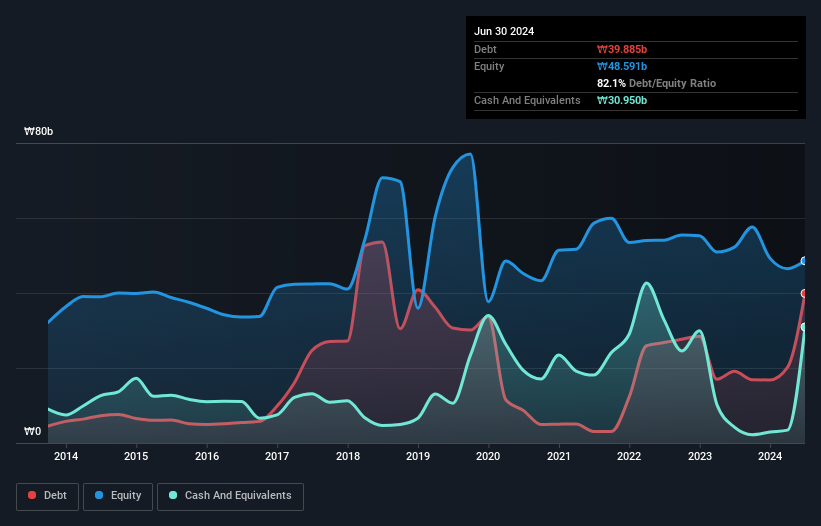- South Korea
- /
- Communications
- /
- KOSDAQ:A069540
Would Lightron Fiber-Optic Devices (KOSDAQ:069540) Be Better Off With Less Debt?
Warren Buffett famously said, 'Volatility is far from synonymous with risk.' When we think about how risky a company is, we always like to look at its use of debt, since debt overload can lead to ruin. As with many other companies Lightron Fiber-Optic Devices Inc. (KOSDAQ:069540) makes use of debt. But the real question is whether this debt is making the company risky.
Why Does Debt Bring Risk?
Debt is a tool to help businesses grow, but if a business is incapable of paying off its lenders, then it exists at their mercy. Part and parcel of capitalism is the process of 'creative destruction' where failed businesses are mercilessly liquidated by their bankers. However, a more common (but still painful) scenario is that it has to raise new equity capital at a low price, thus permanently diluting shareholders. Of course, plenty of companies use debt to fund growth, without any negative consequences. When we think about a company's use of debt, we first look at cash and debt together.
See our latest analysis for Lightron Fiber-Optic Devices
What Is Lightron Fiber-Optic Devices's Net Debt?
You can click the graphic below for the historical numbers, but it shows that as of June 2024 Lightron Fiber-Optic Devices had ₩39.9b of debt, an increase on ₩19.1b, over one year. However, it also had ₩30.9b in cash, and so its net debt is ₩8.94b.

A Look At Lightron Fiber-Optic Devices' Liabilities
The latest balance sheet data shows that Lightron Fiber-Optic Devices had liabilities of ₩44.4b due within a year, and liabilities of ₩3.78b falling due after that. Offsetting these obligations, it had cash of ₩30.9b as well as receivables valued at ₩3.93b due within 12 months. So its liabilities total ₩13.3b more than the combination of its cash and short-term receivables.
This deficit isn't so bad because Lightron Fiber-Optic Devices is worth ₩62.0b, and thus could probably raise enough capital to shore up its balance sheet, if the need arose. However, it is still worthwhile taking a close look at its ability to pay off debt. There's no doubt that we learn most about debt from the balance sheet. But it is Lightron Fiber-Optic Devices's earnings that will influence how the balance sheet holds up in the future. So if you're keen to discover more about its earnings, it might be worth checking out this graph of its long term earnings trend.
Over 12 months, Lightron Fiber-Optic Devices made a loss at the EBIT level, and saw its revenue drop to ₩20b, which is a fall of 43%. That makes us nervous, to say the least.
Caveat Emptor
While Lightron Fiber-Optic Devices's falling revenue is about as heartwarming as a wet blanket, arguably its earnings before interest and tax (EBIT) loss is even less appealing. Its EBIT loss was a whopping ₩8.7b. When we look at that and recall the liabilities on its balance sheet, relative to cash, it seems unwise to us for the company to have any debt. So we think its balance sheet is a little strained, though not beyond repair. Another cause for caution is that is bled ₩6.1b in negative free cash flow over the last twelve months. So in short it's a really risky stock. The balance sheet is clearly the area to focus on when you are analysing debt. However, not all investment risk resides within the balance sheet - far from it. These risks can be hard to spot. Every company has them, and we've spotted 4 warning signs for Lightron Fiber-Optic Devices (of which 3 can't be ignored!) you should know about.
Of course, if you're the type of investor who prefers buying stocks without the burden of debt, then don't hesitate to discover our exclusive list of net cash growth stocks, today.
New: AI Stock Screener & Alerts
Our new AI Stock Screener scans the market every day to uncover opportunities.
• Dividend Powerhouses (3%+ Yield)
• Undervalued Small Caps with Insider Buying
• High growth Tech and AI Companies
Or build your own from over 50 metrics.
Have feedback on this article? Concerned about the content? Get in touch with us directly. Alternatively, email editorial-team (at) simplywallst.com.
This article by Simply Wall St is general in nature. We provide commentary based on historical data and analyst forecasts only using an unbiased methodology and our articles are not intended to be financial advice. It does not constitute a recommendation to buy or sell any stock, and does not take account of your objectives, or your financial situation. We aim to bring you long-term focused analysis driven by fundamental data. Note that our analysis may not factor in the latest price-sensitive company announcements or qualitative material. Simply Wall St has no position in any stocks mentioned.
About KOSDAQ:A069540
Lightron Fiber-Optic Devices
Engages in the manufacturing and selling of communication products in South Korea.
Excellent balance sheet with slight risk.
Market Insights
Weekly Picks

Solutions by stc: 34% Upside in Saudi's Digital Transformation Leader


The AI Infrastructure Giant Grows Into Its Valuation
Recently Updated Narratives


The Great Strategy Swap – Selling "Old Auto" to Buy "Future Light"


Not a Bubble, But the "Industrial Revolution 4.0" Engine


The "David vs. Goliath" AI Trade – Why Second Place is Worth Billions
Popular Narratives


MicroVision will explode future revenue by 380.37% with a vision towards success


NVDA: Expanding AI Demand Will Drive Major Data Center Investments Through 2026



